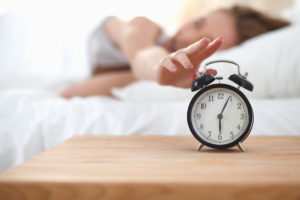As much as we love adventure and novelty, most of us crave a sense of groundedness in routine and the certainty that comes with a predictable cycle. Much of this can be attributed to our cyclical nature as humans, with science just now starting to uncover the meaning behind why we sleep for roughly one-third of our lives.
We all know how rejuvenating a good night’s sleep in our own bed feels, and conversely, how off putting a terrible sleep can be for our mood, productivity, motivation and lifestyle choices. One bad night’s sleep can serve as the first domino, throwing off a circadian rhythm that enables your body to automatically wake up and go to sleep, without the aid of an alarm clock, prescriptions, or widely used over-the-counter sleep medications.
Your Body’s Internal Clock
The circadian rhythm is a biological mechanism that not only controls the sleep-wake cycle, but also the hormones that are released for ovulation and digestion. Your “master body clock,” made up of roughly 20,000 nerve cells known as the suprachiasmatic nucleus (SCN), greatly influences the circadian rhythm.
The SCN is affected by natural light from the sun, as well as unnatural light sources like blue light from digital screens. During the day, the SCN picks up the cue that it’s daylight and time to energize, while at nighttime, when the sunlight dims, it sends a signal to the body to produce and secrete more melatonin hormone, which aids in sleep.
When we add unnatural light before bed, regardless of how tired we were prior, the SCN will inhibit the production of melatonin, keeping us awake and unable to undergo the vital functions that occur during sleep, such as cell repair and detoxification.
Alongside putting down your phone and laptop before bed, there are various things that you can do to reset your clock, helping you lock in deep sleep and go throughout your day with ease.
Get natural light first thing in the morning.
Opening the blinds or stepping outside right when you wake up will help signal your body to halt the production of melatonin and signal the adrenal glands to start producing cortisol, according to Susan Blum, M.D., MPH, assistant clinical professor at the Icahn School of Medicine at Mount Sinai, as cited by Mind Body Green.
Research has also demonstrated that morning or not, prolonged exposure to natural light can help reset your internal clock. A study from the University of Colorado showed that one weekend camping trip reset the body’s internal clock, and debunked the idea that some of us are “night owls.”
Daylight simulation alarm clock.
As an alternative to natural light, the next best thing could be a natural light alarm clock. These daylight simulation clocks kick into gear a half hour before wake up time, emitting a soft glow and steadily growing to full brightness by your indicated wake up time. This is a great option for those with non-traditional work schedules, or those who live in a room without easy access to natural light.
Consider stress reduction techniques and exercises.
Cortisol, nature’s built-in alarm system, elevates in times of stress. Chronically high levels of cortisol can lead to sleep disorders and other detrimental health issues.
There are countless ways to reduce stress, from simply breathing and going outside throughout the day, to getting more creative with activities that suit you personally, such as practicing an instrument or gardening.
While high intensity workouts are effective in reducing stress, they are best performed in the morning or early afternoon, as they increase cortisol and can, therefore, disrupt your natural sleep cycle.
Go light on dinner.
Eating a heavy meal before bed may not only lead to indigestion, but can get in the way of your body’s natural process of producing serotonin and melatonin. Meals particularly heavy on fats and sugars should be avoided late at night.
Melatonin-rich foods, such as cherries, are good options for a night-time snack, as well as tryptophan-containing foods like beans, oats and pumpkin seeds.




